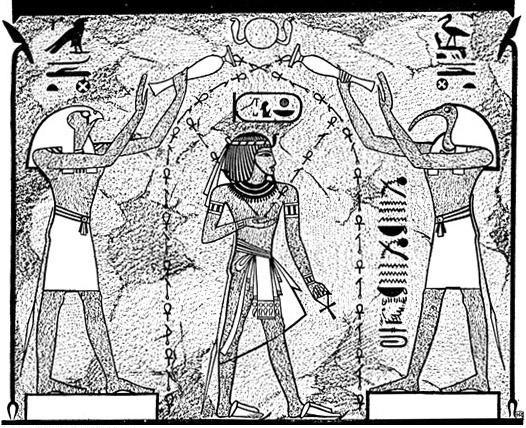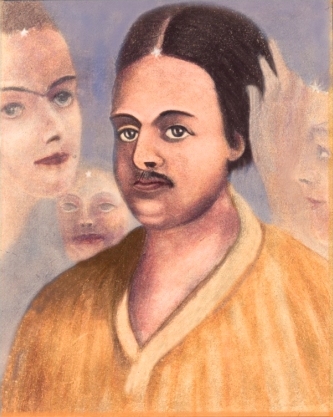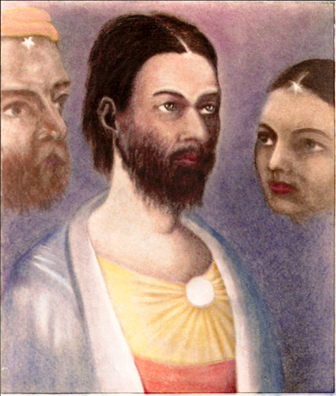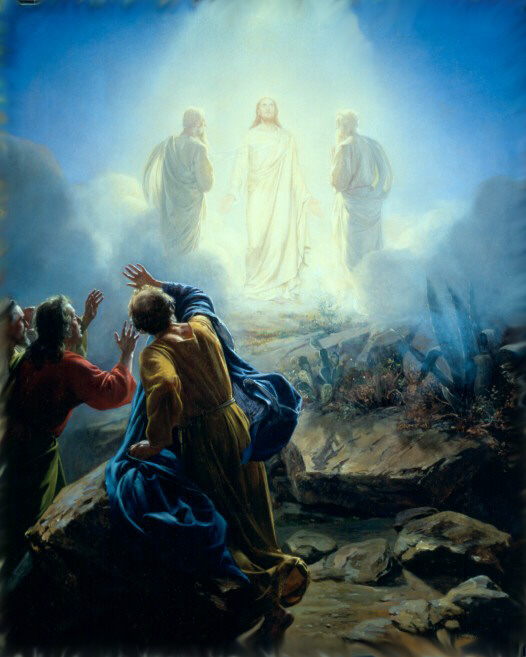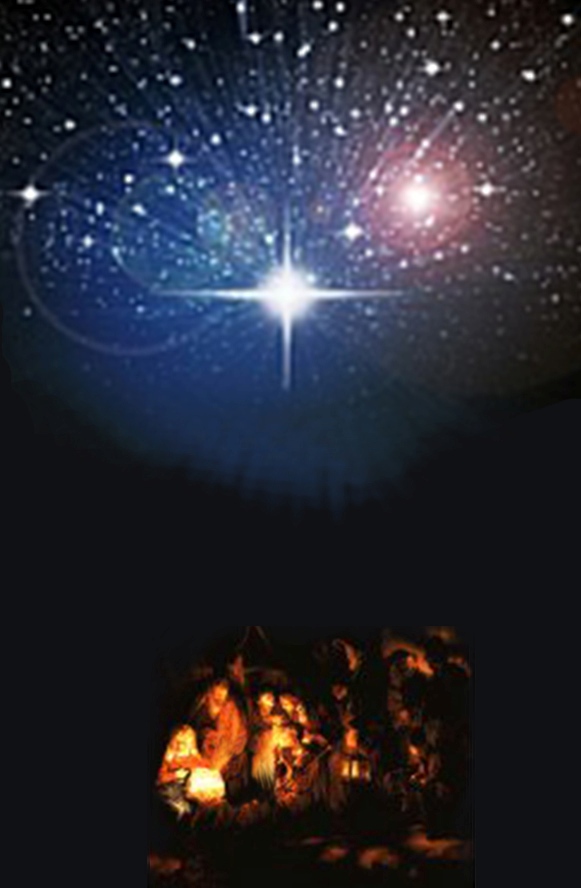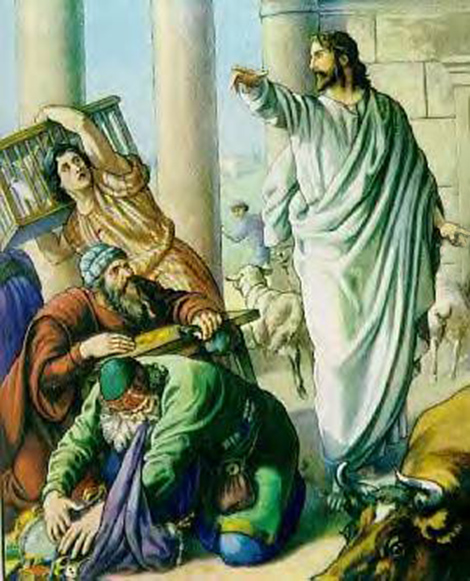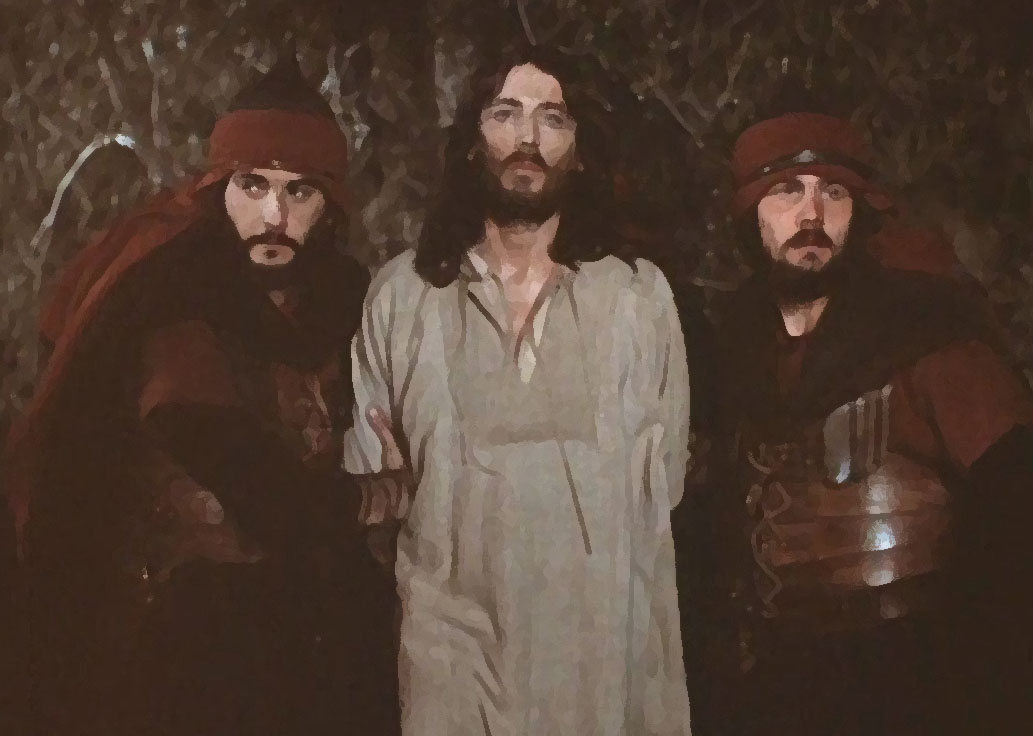Oahspe StudyWho was Jesus of Nazareth
Before the Christians adopted Jesus of Nazareth (as depicted in the Gospels of the New Testament as the Messiah or embodiment of Christ) in 325 C.E. at the Ecumenical Council of Nicea, Christ (as the source of Gnosis, in the form of a purely spiritual redeemer), was the basis of Early Christianity as practiced by the Christian Gnostics (See What is the origin of Christ). From the time of the Council, Gnostics who would not accept Jesus as Christ were declared heretical and their form of Christianity was suppressed.
But was there such a person as Jesus, or was he just a myth? If he existed who was he really? And if he was a myth ~ even a myth requires a basis and context. What was it?
From Oahspe we trace the etymology of the name Jesus to before it appeared in English translations of the Christian Gospels of the 17th century, to before it was even the name of any individual person. Jesus is the anglicized form of Iesus (Latin) which scholars believe derives from the Hebrew name/title Yeshua, which can be traced back to at least the time of Moses in the Old Testament writings. But Oahspe reveals that "Yeshuah" was the name of a heavenly place of salvation long before it was applied to any particular man.
Oahspe, Book of Ah'shong: ||07/2.11. Ah'shong built the place [his heavenly kingdom] as commanded by Jehovih, and when it was finished, Jehovih said: You shall call the place Yeshuah. And it was called that because it was a place of salvation.... 07/8.4. ....God said: In the time of kosmon, men shall say: Where did the name of heavenly things come from? But the origin of Yeshuah shall lie hidden away, and Jehovih will stretch forth His hand in that day and disclose all. 07/8.5. But mortals were thick in tongue, and could not say Yeshuah, and they said I. E. Su; from which came the name of many men, Iesu, signifying, without evil, which is the ultimate salvation of the soul.||
Parsing Yeshuah into its components, we get Y-es-huah. In the first language (Panic), Y at the beginning of the word acts as indicator of direction or trend, Es denotes Spirit and Huah denotes Man. Thus the meaning becomes "Place or condition of the Spirit Man" in contrast to the animal nature of man. And it was so, that Ah'shong's heavenly place, many millennia ago, was established to develop mankind along the path of ascension in spirit.
The term, Iesu, came to be applied to men of purity and prophets. Oahspe reveals that various prophets and leader-forths were natural born "Yeshuahs" or "Iesus", among them, Zarathustra (the Pure) of Par'sie (Persia), Capilya of Vind'yu (India), Joshu the Essene of Nazareth, Po and Chine of Jaffeth (China). One of the physical manifestations of the condition of natural born Iesu, is the "doubtful gender" or "passionless birth".
Oahspe, Book of God's Word: ||21/2.4. ....Behold, this child [Zarathustra] has no sex! He is an Yeshuah (Iesu), a passionless birth.||
Hebrew retains the closest enunciation to the original word, Yeshuah, as in Jehoshua, which is shortened to Joshua and Jeshua. It is a male name meaning "Jehovah is helper" or "Jehovah is his help" or "Jehovah is salvation" or "Jehovah the Savior" all of which probably derived from earlier meanings of "[an example of] Jehovah's salvation" or "[vehicle of] Jehovah's salvation". The word became applied as a descriptor to men such as Moses and his successor/s (known to later generations as the Judges). By the time of Ezra (who, with his scribes, had collected and written the "Ezra Bible" by 495 b.c.e. when the Jews had returned from Babylon), Joshua was no longer known as a title but the actual name of a person (See The Mythical Conquest of Caanan.)
In context of the history of the Israelites from the time of Moses, the transference of Jehoshua as a title to an individual's name reflects the fall from both purity and the worship of the All One, EOIh. By Ezra's time, the majority of Israelites and Jews had long fallen from much of the original Mosaic teachings which had been orally transferred from generation to generation among those faithful to EOIh, the All One. The northern kingdom of Israel was already scattered and lost, and the Jews were subject to the law of Kings and priests. Thus the establishment of the Torah in Ezra's time occurred in retrospect, lacking the clarity and understanding of the original Mosaic religion.
There was no king or hierarchy of priests to interpret or enforce written laws when Moses led the Hebrews out of Egypt. They were organized in families and communities of tens and "tens of tens," with fathers (rabbis) at their heads. The "Yeshuah" Moses, as chief of the fathers, held responsibility for the salvation of Israel, as did Moses' successors, and these were called Yeshuah (Jehoshua) also. For hundreds of years these chiefs held Israel fast to the covenants. Yet cracks appeared, then broadened, for some Israelite men married Canaanite women. And their offspring became idol worshippers, took to war and clamored for kings. But those Israelites who remained faithful to "EOIh the All One" established a College of Prophets, producing prophets who continually strove to bring the apostates and their kings back to purity and faith in the All One.
By the time of the second temple, around 516 b.c.e., when the Jews were restored to Jerusalem from Babylon, Joshua as a man's name had become common. By that time, the concept of "Messiah" or "anointed one" as an expected kingly savior, had fully displaced the Yeshuahs of old as the anticipated national means for Israel's salvation. This transference to a kingly savior (of the line of David) reflected the apostate condition many of the Jews had reached as subjects of kings.
The rise in Messianism in the Jewish religion occurred in the context of The Age of Saviors (See What is the origin of Christ) which, from about 700 to 500 b.c.e., had produced numerous martyred saviors as far away as India and China. This era influenced the religions of many existing peoples, including the outlook of the Jews, who also came to expect a (kingly) Messiah to save and lead them. Yet we can trace the word "Messiah" back to "Moses". Messiah is the Hebrew word "mashiach/mah-shee-ahch" ~ anointed one. Its root word is "meshiyach". The verb mashach means "to anoint" ~ Among the ancient Hebrew it was customary to pour oil on the head of one who is being given a position of authority. And so we can see that "Messiah" and "Moses" are close phonetically, but they also share meanings. According to Oahspe, Moses does not mean "Drawn out of the water" but "Leader-forth". Moses was also a name of Egyptian kings (Moses was Amenemhat III's heir and regent for 9 years; as regent he attained status as co-ruler with Pharoah - See Who was Moses). The name Moses can also be found in the Egyptian rulers Ramses (Ra-moses) and Tutmose (Tut-moses). Ancient Egyptian Kings were also anointed, and there are many depictions of Pharaoh's receiving anointment. |
|
|
In various ancient cultures, it was believed that Divinity could, by anointing, be transferred into men. In several temple reliefs in Ancient Egypt the Pharaoh is depicted being anointed by Horus (sun god and "father" of Pharaoh) and Thoth (god of wisdom), the oil of which is symbolically depicted as a stream of ankhs (symbols of life).
|
|
It was amid the social ferment of peoples and nations being stirred up by saviors and thoughts of "being saved" that the prophets of EOIh, the All One, prophesied the birth of one who would restore that which had been at the time of Moses but was afterward lost. While the prophecy actually pertained to the birth of an Essene foreordained (anointed as it were) by heaven, yet the apostate Jews looked for a messiah in the role of an earthly king, for they expected the anointed one to be descended from the lineage of a king who could restore them back to a condition of sovereignty and proposperity as a nation rather than the spiritual and religious purity of the Mosaic religious communities. This was because in their minds, the king was the highest order of society capable of leading them to safety and restoration, as previously alluded to.
Ultimately, the Christians appropriated the meaning of Christ (Kh-r-stos in Greek) to be the equivalent of the expected Jewish Messiah who was to be born of the line of David. Lists of patriarchs for Joseph who, according to the Christian Gospels, was not supposed to be the biological father of Jesus, are included in the Christian Gospels intended to prove the legitimacy of Jesus. These lists however are inexplicably inconsistent, appearing to be the product of (poor) "theological craftsmanship".
When the title of Iesu (Latin), (Isous in Greek), was adopted by the Roman Empire Council of Nicea as the name of the mortal representative of Christ (Kriste, Khristos), Iesus became his name (to represent his role as savior) rather than his title, and the representative nature of the composite Iesus spawned by the Ecumenical Council was cleverly hidden. Latin ultimately shifted the initial I to a J, not just Iesu to Jesu or Iesus to Jesus; but in other words as well, e.g., Iupiter to Jupiter, Ianus to Janus, Iuno to Juno (June), etc.
From Oahspe, we find that the Roman Emperor, Constantine who had become influenced by Looeamong the false Kriste, called together the Council of Nicea to decide upon the one religion: Oahspe, Book of Eskra, Chapter 48 Looeamong [the angel] inspired Hatuas [Constantine], the mortal emperor, to call together a council of wise men from all the kingdoms of Arabin'ya, Heleste, Par'si'e and Uropa, in order to select from all the religious doctrines in the world, that which was the wisest and best, so that it could be established, by kings, emperors and governors, by the sword and spear, so there would never again be more than one religion. Now, the council had brought with them, in all, two thousand two hundred and thirty‑one books and legendary tales of Gods and Saviors and great men, together with a record of the doctrines taught by them. Hatuas, being under the inspiration of Looeamong, through [Angel] Gabriel, alias Thoth, thus spoke: Search these books, and whatever is good in them, retain; but, whatever is evil, cast away. What is good in one book, unite with that which is good in another book. And whatever is thus brought together shall be called, The Book of Books.* And it shall be the doctrine of my people, which I will recommend to all nations, so that there shall be no more war for religion's sake. For four years and seven months the council thus deliberated, and selected from the two thousand two hundred and thirty‑one books and legendary tales. And, at the end of that time, there had been selected and combined much that was good and great, and worded so as to be well remembered by mortals. As yet, no God had been selected by the council, and so they balloted, in order to determine that matter. For one year and five months the balloting lasted, and at that time the ballot rested nearly equally on five Gods, namely: Jove, Kriste, Mars, Crite and Siva. And here the ballot did not change for the next seven times, which was seven weeks. Hatuas spoke before the council, saying: Ours is a labor for all the nations of the earth, and for all time. I know the angels of heaven are with us in this matter. We have found five Gods, good and acceptable before the world. What do you say, council, that the angels give us a sign? For we all know the angels' signs of these Gods. The council said: Well said, you wisest of men! Such a God shall be ours, now and forever. And immediately, there and then, Looeamong and his angels gave a sign in fire, of a cross smeared with blood, and it rested on a bull's horns, like a cloud of fire on a cloud of fire! And at this, Kriste was declared God and Lord of all the nations of the earth. And the council agreed to this, unanimously, and, moreover, to reject all the other Gods. The next question was, what mortal representative should be chosen? The first ballot brought out the following men: Zarathustra, Thothma, Abraham, Brahma, Atys, Thammus, Joshu, Sakaya, Habron, Bali, Crite, Chrisna, Thulis, Wittoba and Speio. Besides these, there were included in the ballot, forty‑six other men, who received a small number of ballots each. || God, Son of Jehovih, said: Behold, the Council of Nice (Nicaea) balloted for twelve months, as to what man heard the Voice? Do you say Jehovih sends His matters to a council of men? || Hatuas said: The Gods will not let us choose any man. Now, therefore, hear me: All the lawgivers chosen by the Gods have been iesu. Now, since we cannot make preference as to a man, let us say: The man, Iesu. So the name, Iesu, was adopted, and the sacred books were written accordingly.** God, Son of Jehovih, said: The council of Nice did not sin, for the doctrines set forth, as Iesu's, were for Jehovih. But, where their words made worshipful the names of Kriste and the Holy Ghost, behold, that matter was with Looeamong. God said: My testimonies were previously with Abraham, Brahma and Moses, and I did not speak of Kriste nor of the Holy Ghost, I spoke of God and of the I Am. They have said: || Whoever speaks a word against the son of man, it shall be forgiven him; but, whoever speaks against the Holy Ghost, it shall not be forgiven him. || Therefore, let Looeamong bear his own testimony to the kingdom from which it sprang. The Holy Ghost was his labor. Jehovih said: Had I weakened since the time of Moses, that I need to incarnate Myself, in order to make man understand Me? God said: Sufficient for the time is the work of Jehovih; because the Triunes overthrew the oracles and hundreds of false Gods and hundreds of sacred books full of error and evil, behold they fulfilled their time. *The "Book of books" which came out of the Council of Nicea is the Christian Bible, being composed of (1) parts of the Ezra Bible, which was called the Old Testament; and (2) the composite books of the new doctrine (Kriste'yan doctrine) called the New Testament. The purpose of this latter was to set forth the policies of Kriste, and to establish his presence among mortals via Iesu. The groundwork for this latter goal was accomplished through bringing together diverse stories of many different Iesu's and concocting them into a single story with only one representative, i.e., one symbolic Iesu (Iesus, Jesu, Jesus). **Note regarding this fabricated story of the representative iesu that, indeed, for the whole of the time period from his supposed birth to his supposed crucifixion, there is no statement in the available Roman records mentioning a Jesus, as identified by the Christian story.
As is shown from Oahspe, the Nicean Council invented a composite character called "Iesu", drawing upon the mythmaking tradition of constructing a person from a title, similar to the construction of the first Joshua, Conqueror of Canaan appearing in the Ezra Bible i.e. the Old Testament (See The Myth of the Invasion of Canaan). Although aspects of the Essene Joshu's life and teachings were included in the composite Iesu story that came out of the Council of Nicea, more ancient iesus such as Zarathustra (whose life-story had previously been woven into various mythical personages) became a part of the Christian Iesu story.
According to Oahspe, the "virgin birth" originates from the life-story of the original Zarathustra: Oahspe, Book of God's Word: ||21/2.7. ....And the child's mother's name was Too'che, and the father's name Lo'ab. Too'che herself was su'is born, and before she conceived, was obsessed by Sa'moan, an angel; and during the time of maternity she was not suffered to wake from her unconscious trance. And by the loo'is [certain angels], her soul was often taken to high heaven (etherea) to see its glories, and then returned to inhabit her own body. Thus, the child was born of All Light, and at that same time the obsession fled, and Too'che proclaimed within the city that no man was father to the child, but that she conceived from All Light, believing so, because she was unconscious during gestation.||
Also from Zarathustra's life-story are found other details such as wise men searching for the babe and the king's search for the infant and the proclamation that infants were to be put to death unless the babe was found; feeding the thousands of hungry; bringing the dead back to life and being put to death and appearing to the living after three days. (Oahspe, Book of God's Word) |
|
|
Portrait of Zarathustra who, according to Oahspe, lived around 7000 B.C.E.
|
|
We also find that in other parts of the world, the creators of mythical saviors had already previously appropriated similar details, i.e., the Egyptian Horus, the Persian Mithra, the Greek Prometheus, the Hindu Krishna, and various others. Similarities of Jesus and Krishna ||....If one were to delete from the Gospels the events in Jesus' life that seem to originate in Krishna's story, one would basically end up with a story of: A very human, itinerant, Jewish, rabbi-healer. A teacher who largely followed the teachings of Hillel -- a liberal Jewish rabbi from the 1st century BCE. An observant Jew who had a special relationship with God -- a kinship so close that Jesus referred to God by the familiar term "Abba." This is very close to the image of Jesus uncovered by many liberal theologians, in their quest for the historical Jesus. If the events in Jesus' life that appear to come from Krishna were eliminated as invalid, then most of the key Christian beliefs about Jesus would have to be abandoned: his virgin birth, incarnation, sinless life, crucifixion, descent into Hell, resurrection, ascension to heaven. Criteria for salvation, belief in the Trinity, the inerrancy of the Bible, the inspiration of the authors of the Bible by God, etc. would also have to be rejected....||
Some Scholars believe there are references to Jesus in the Talmud and Mishna, which contain a number of references to Yeshu. Such references portray Yeshu as a sorcerer and idolater who was stoned at Passover. It may well be that these are references to the Essene Joshu who was stoned to death in Jerusalem by apostate Jews for preaching the All One. The "Sermon on the Mount" in the Christian Gospels has been attributed to Joshu the Essene of Nazareth.
||The eminent Swiss theologian, Dr. Wetstein, says: "It is a curious fact that the Lord's Prayer may be constructed almost verbatim out of the Talmud. The Sermon on the Mount is derived largely from the teachings of the Essenes, a Jewish sect to which Jesus is believed by many to have belonged."||
According to Oahspe, Joshu of Nazareth was born of the parents Mara and Joseph and brought up within the Essene community: From Oahspe, Book of Eskra, Chapters 42, 43 and 44: The Essene Community And these angels inspired seven hundred Israelites to separate themselves from all other people, and to go and live by direction of the angels of Jehovih. Moreover, the angels inspired these people to call themselves Es'eans*, as commanded by Moses in heaven. (*followers of the spirit in contradistinction to those who follow the dictates of the flesh; today we know them as Essenes). These Es'eans were, therefore, a separate people, pledged to Jehovih to have no king or earth-ruler, except their rab'bahs. And they dwelt in communities and families of tens, twenties and hundreds, holding all things in common. But in marriage, they were monogamic; nor would they have more than one suit of clothes each; and they lived on fruit and herbs (vegetables) only; nor did they eat fish or flesh of anything that had ever breathed the breath of life. And they bathed every morning at sunrise, and worshipped before the altar of Jehovih, doing, in all things, in the manner of the ancient Faithists. By virtue of the angel hosts who were with them, they did these things. And they held communion with the angels of heaven, every night before going to sleep.... And though the Es'eans lived in great purity of body and soul, yet they were evilly slandered by the world' people all around them. But Jehovih prospered the seed of the Es'ans, in holiness and love, for many generations. Then came Gafonaya, chief of the loo'is, according to the command of God, to raise up an heir to the Voice of Jehovih. And in four more generations, an heir was born, and named, Joshu, and he was the child of Joseph and his wife, Mara, devout worshippers of Jehovih, who stood aloof from all other people, except the Es'eans. And because of the extreme youth of Mara, the child was of doubtful sex; regarding which, the rab'bahs said the child was an iesu, signifying neutral. The time of the birth of the child was three days after the descent of a heavenly ship from the throne of God. And many of the Es'eans looked up and saw the star, and they felt the cold wind of the higher heavens fall upon the place and around the tent, where the child would be born. And they said to one another: Jehovih remembers us.... When the birth was completed, the angels of heaven re‑entered their star‑ship and hastened back to Paradise, God's heavenly seat.... When Joshu was grown up, and ready for his labor, God provided a host of one hundred million angels to make a line of light from his Holy Council down to the earth; and they made it so. And God provided a guardian host of two billion angels to protect the line of communication; for it was a time of war in heaven and earth.... And Moses and Elias went and stood before Joshu, and he saw them. Moses said to him: My son! My son! The light of Eloih is upon you. Israel, through you, shall regain the All One, which was lost. |
|
|
Portrait of Joshu, who was of Israelitish birth, and also an i‑e‑su. His parents Joseph and Mara were of the tribe called Es'seans (Essenes), or non‑resistants. He labored to restore the true Mosaic teachings. Ultimately he was stoned to death in Jerusalem. He also taught the doctrine of one Great Spirit only. In the Christian New Testament it has been supposed that the so‑called Sermon on the Mount is a plagiarism on Joshu's teachings, adapted by the Ecumenical Council under the direction of the emperor Constantine.
|
|
Joshu's Doctrines: God said: These were my doctrines, as I taught through Joshu: You shall keep the ten commandments of Moses. You shall not engage in war, nor abet war. You shall eat no flesh of any animal, fish, bird, fowl, or creeping thing that Jehovih created alive. You shall dwell in families [communities ~Ed.], in the manner of the ancient Israelites, who held all things in common. You shall have no king or queen, nor bow down in worship to any, except your Creator. You shall not call on the name of angels to worship them, nor to counsel with them on the affairs of earth. You shall love your neighbor as yourself, and do to your fellow man as you would have him do to you. You shall return good for evil, and pity to those who sin. It has been said: An eye for an eye, a tooth for a tooth; but I say, return good for evil. And if a man hits you on one cheek, turn the other to him also. The man shall have only one wife, and the woman only one husband. As the children honor the father, so will the family be blessed with peace and plenty. Remember, that all things are of Jehovih, and you are His servants, to help one another. And as much as you do these services to one another, so do you serve Jehovih. Behold only the virtues and wisdom in your neighbor; his faults you shall not discover. Do not call on the name of any God or Lord in worship; but worship Jehovih only. And when you pray, let it be in this manner: Jehovih, Who rules in heaven and earth, hallowed be Your name, and reverent among men. Sufficient for me is my daily bread; and as much as I forgive those who trespass against me, so forgive me, and make me steadfast to shun temptation, for all honor and glory are Yours, worlds without end. Amen! To visit the sick and distressed, the helpless and blind, and to relieve them; to provide for the widow and orphan, and keep yourself unspotted before men; these are the way of redemption. You shall take no part in the governments of men, but observe the will of Jehovih, being obedient to all governments for His sake. All men are the children of One Father, Who is Jehovih; and whoever chooses Him, and keeps His commandments, is His chosen. To preserve the seed of His chosen, you shall only wed with the chosen. Do not contend with any man for opinion's sake, nor for any earthly thing. And let your speech be for other's joy; or do not open your mouth, if your words will give pain. Therefore, be considerate with your speech; teaching others by gentleness and love, to be respectful toward all men. Preserve the sacred days of the rab'bahs; and the rites and ceremonies of emethachavah.
Joshu's Ministry and Death For three years, Joshu traveled among the Israelites, preaching, and restoring the ancient doctrines. And there were gathered in groups, of tens, twenties and fifties, more than two thousand Israelites, of the ancient Order of Moses, who became steadfast followers of the teachings of Joshu. But, because of persecution by the apostate Jews, they kept themselves aloof from the world, having signs and passwords, by which they knew one another. First the God, Baal, and after him, Thoth, inspired the kings and rulers, against these Faithists. And they proved them by commanding them to eat flesh, even swine's flesh, which, if they refused, was sufficient testimony under the laws, to convict them of being enemies against the Gods. So they were scourged, and put to death, whenever found. Now it came to pass that Joshu went into Jerusalem to preach, and in not many days after that, he was accused of preaching Jehovih. And he was arrested, and while being carried to prison, he said: You are hypocrites and blasphemers! You practice none of the commandments, but all the evils of satan. Behold, the temple shall be split in two, and you shall become vagabonds on the earth. At that, the multitude cast stones upon him, and killed him! And Jehovih sent a chariot of fire, and bore his soul to Paradise.
|
|
Some details of Joshu's birth and ministry were appropriated in the Christian Gospel Story
|
|||
|
|
|
|
|
|
And Moses and Elias went and stood before Joshu, and he saw them. Moses said to him: My son! My son! The light of Eloih is upon you. Israel, through you, shall regain the All One, which was lost.
|
The time of the birth of the child was three days after the descent of a heavenly ship from the throne of God. And many of the Es'eans looked up and saw the star, and they felt the cold wind of the higher heavens fall upon the place and around the tent, where the child would be born. And they said to one another: Jehovih remembers us....
|
Now it came to pass that Joshu went into Jerusalem to preach, and in not many days after that, he was accused of preaching Jehovih.
|
And he was arrested, and while being carried to prison, he said: "You are hypocrites and blasphemers! You practice none of the commandments, but all the evils of satan. Behold, the temple shall be split in two, and you shall become vagabonds on the earth."
|
All Oahspe references are from the Standard
Edition Oahspe of 2007
·
GO TO NEXT ARTICLE:
What is the Origin of Christ
